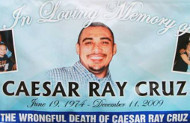Federal Court Chides California Cops For Shooting Unarmed MotoristFederal appeals court openly skeptical of police claims in shooting of unarmed motorist in Anaheim, California.TheNewspaper Sep. 03, 2014 |
Popular 
America Last: House Bill Provides $26B for Israel, $61B for Ukraine and Zero to Secure U.S. Border

Report: Blinken Sitting On Staff Recommendations to Sanction Israeli Military Units Linked to Killings or Rapes

Bari Weiss' Free Speech Martyr Uri Berliner Wants FBI and Police to Spy on Pro-Palestine Activists

John Hagee Cheers Israel-Iran Battle as 'Gog and Magog War,' Will Lobby Congress Not to Deescalate

Telegram Founder Changed Mind on Setting Up Shop in San Francisco After Being Robbed Leaving Twitter HQ
  An internal investigation cleared police officers in Anaheim, California of the 2009 shooting of an unarmed motorist, but the US Court of Appeals for the Ninth Circuit last week said not so fast. A three-judge panel questioned the official version of events and said a jury should decide whether the officers were reckless. An internal investigation cleared police officers in Anaheim, California of the 2009 shooting of an unarmed motorist, but the US Court of Appeals for the Ninth Circuit last week said not so fast. A three-judge panel questioned the official version of events and said a jury should decide whether the officers were reckless.The fatal incident was sparked by a snitch who told Anaheim detectives that Caesar Cruz was a gang member who sold meth and carried a gun. Cruz had been to jail once on a drug charge seven years previously, but Anaheim officers thought Cruz was a parolee, meaning he was subject to routine police searches. On December 11, 2009, five officers in marked and unmarked vehicles were sent to converge on Cruz while he was in his green Chevy Suburban in a Walmart parking lot. Cruz initially tried to escape, then he stopped. He opened the door of his SUV as police with weapons drawn ordered him to get to the ground. At this point, officers say they saw Cruz reach for the waistband of his pants. Five officers opened fire, sending twenty shots toward Cruz in the space of about three seconds. Cruz's body was found tangled in his seatbelt, unarmed. A 9mm pistol was recovered from the passenger seat. "After a thorough review of all the facts and the applicable law in this incident, we have concluded that the evidence does not support a finding of criminal culpability on the behalf of any officers at the Anaheim Police Department," the Orange County district attorney's office concluded. Calling what the police did an execution, Cruz's family filed a federal wrongful death lawsuit, but US District Judge Margaret M. Morrow found no reason not to believe the official account of events. The three-judge appellate panel agreed that it is always reasonable for police to open fire if a suspect is reaching for a gun, especially if the suspect had just attempted to escape. The simple question the appellate judges asked was, did Cruz reach for a gun? The panel insisted that the court cannot simply accept the "self-serving account" of events from a police officer. "Because the person most likely to rebut the officers' version of events -- the one killed -- can't testify, the judge must carefully examine all the evidence in the record to determine whether the officer's story is internally consistent and consistent with other known facts," Chief Judge Alex Kozinski wrote for the court. "In this case, there's circumstantial evidence that could give a reasonable jury pause." The panel found it plausible that Cruz could have reached for a gun in the belief that he could shoot his way out of the situation, but this explanation is undermined by one key fact. "For him to make such a gesture when no gun is there makes no sense whatsoever," Judge Kozinski wrote. "Of course, a jury could reach the opposite conclusion. It might believe that Cruz thought he had the gun there, or maybe he had a death wish, or perhaps his pants were falling down at the worst possible moment. But the jury could also reasonably conclude that the officers lied." The appellate court raised the almost identical case of David Raya who was shot in the back, while unarmed, by several of the same officers who killed Cruz. "'They both reached for the gun' might be a plausible defense from officers in the line of duty," Judge Kozinski wrote. "'They both reached for no gun' sounds more like a song-and-dance." The panel also pointed out that it was implausible that all four officers were able to clearly see Cruz reaching for his waistband and that two of them saw him do it with his right hand. Cruz was left-handed. The panel surmised that a likely version of events was that Cruz was trying to comply with the police order to get on the ground but got caught in his seat belt. The panel left it to a jury to decide whether officers Kelly Phillips, Phillip Vargas, Nathan Stauber and Bruce Linn were lying or not. A copy of the decision is available in a 85k PDF file at the source link below. Source: Cruz v. Anaheim (US Court of Appeals, Ninth Circuit, 8/28/2014) |



